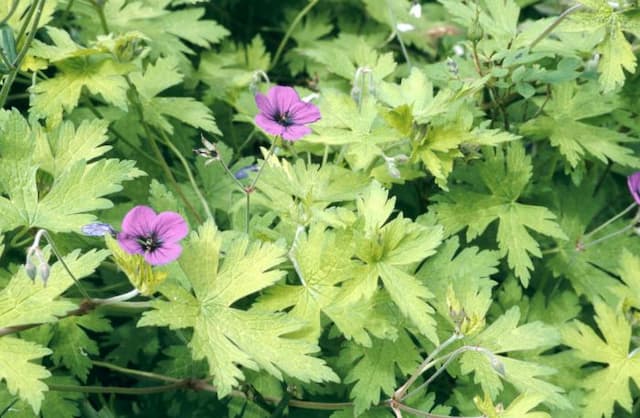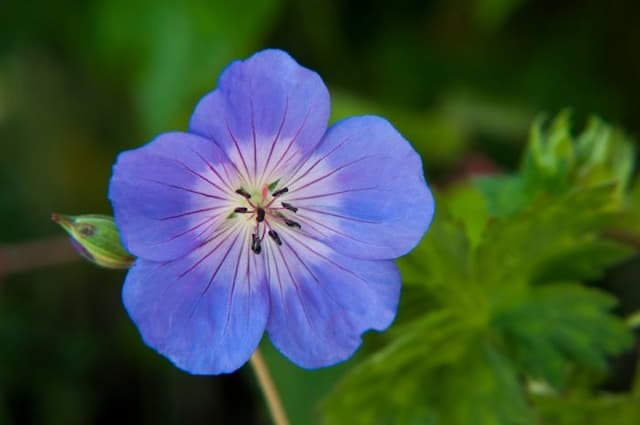Scented Geranium Pelargonium 'Lady Plymouth' (Sc/v)

ABOUT
Pelargonium 'Lady Plymouth', more commonly known as a type of scented geranium, is a visually striking plant recognized for its aesthetically pleasing foliage and flowers. The leaves are quite distinctive, with a bold variegation pattern. They typically display a bright green color with creamy white margins, giving them a beautiful contrast that can enliven any garden space. The texture of the leaves is notably soft to the touch, and they are fondly known for their pleasant fragrance, which is often reminiscent of mint or a subtly sweet aroma that is released when the leaves are bruised or brushed against. The flowers of the scented geranium are delicate and present themselves in rounded clusters. They are usually a pale pink or purple hue, adding a subtle pop of color amongst the variegated foliage. These blooms can appear at various times throughout the growing season, depending on the climate and care the plant receives. The overall form of Pelargonium 'Lady Plymouth' is typically bushy, creating a lush and full appearance. Its growth habit makes it a popular choice for both container gardening and as an addition to garden beds where it can spread its fragrant leaves. The contrast of the cream-edged leaves against the charming flowers makes this plant a sought-after variety among gardeners looking for both visual interest and aromatic appeal.
About this plant
 Names
NamesFamily
Geraniaceae
Synonyms
Lady Plymouth Scented Geranium, Lady Plymouth Geranium, Variegated Rose Scented Geranium
Common names
Pelargonium 'Lady Plymouth'
 Toxicity
ToxicityTo humans
Scented geraniums, which include the variety 'Lady Plymouth', are generally considered non-toxic to humans. They are often grown for their aromatic leaves and are sometimes used in cooking. However, if ingested in large quantities, they may cause mild discomfort or an allergic reaction in sensitive individuals. Common symptoms might include gastrointestinal upset such as nausea, vomiting, or diarrhea. It is always advisable to exercise caution and avoid ingesting plants unless they are known to be safe and intended for human consumption.
To pets
Scented geraniums, including 'Lady Plymouth', are typically non-toxic to pets. They are not known for being poisonous to cats, dogs, or other household animals. However, as with any non-food plant, ingestion may potentially cause mild gastrointestinal upset for some pets, such as vomiting or diarrhea. It is generally recommended to keep plants out of reach of pets to prevent any possible issues, especially if the pet is known to chew on plants.
 Characteristics
CharacteristicsLife cycle
Perennials
Foliage type
Evergreen
Color of leaves
Variegated
Flower color
Pink
Height
1-2 feet (30-60 cm)
Spread
1-2 feet (30-60 cm)
Plant type
Herb
Hardiness zones
10
Native area
South Africa
Benefits
 General Benefits
General Benefits- Aromatic Foliage: The leaves of the Geranium 'Lady Plymouth' release a pleasant scent when brushed against or crushed, which can add an appealing fragrance to gardens and indoor spaces.
- Decorative Appearance: With its attractive variegated foliage and flowers, this plant is a popular choice for adding visual interest to gardens, borders, and containers.
- Drought Tolerance: Geranium 'Lady Plymouth' is quite drought-tolerant once established, making it suitable for xeriscaping and low-water gardens.
- Pest Deterrence: The aromatic leaves are believed to help deter certain pests, making it a good companion plant in vegetable gardens and outdoor living areas.
- Edible Flowers: The blooms of Geranium 'Lady Plymouth' can be used as a decorative and edible garnish in culinary dishes.
- Ease of Care: This plant is known for being low-maintenance, requiring minimal attention to thrive, which is ideal for busy gardeners.
- Adaptability: It is adaptable to various growing conditions, including container culture, which allows it to be grown both indoors and outdoors.
- Long Blooming Season: With proper care, Geranium 'Lady Plymouth' can produce flowers for an extended period, often from spring through fall.
- Propagation: The plant can be easily propagated from cuttings, allowing gardeners to create new plants and expand their collection without additional cost.
 Medical Properties
Medical Properties- Antiseptic: Pelargonium 'Lady Plymouth' essential oils have been suggested to possess antiseptic properties.
- Anxiety relief: The scent of the essential oil is known to have a calming effect and may help alleviate anxiety.
- Astringent: It may be used in skincare for its astringent qualities, which can tighten pores and improve skin texture.
- Anti-inflammatory: There are claims of anti-inflammatory effects, possibly reducing swelling when applied topically.
- Respiratory aid: Historically, the leaves were used in folk medicine to help with respiratory issues, although there's limited scientific evidence for this use.
- Anti-microbial: Some studies suggest that the extracts or essential oils might have anti-microbial properties.
- Pain relief: It is sometimes used in traditional medicine for its analgesic properties to relieve minor aches and pains.
 Air-purifying Qualities
Air-purifying QualitiesThis plant is not specifically known for air purifying qualities.
 Other Uses
Other Uses- Room Freshener: Pelargonium 'Lady Plymouth', also known as scented geranium, can be placed in a bowl to naturally fragrance a room with its pleasant aroma.
- Insect Repellent: The essential oils in scented geranium leaves can be rubbed onto the skin to repel mosquitoes and other pests.
- Skin Care: Infused water from scented geranium leaves can be used as a gentle toning solution for the skin.
- Culinary Flavoring: The leaves of scented geranium can be used to infuse sugar or salts with a subtle, rose-like flavor for culinary use.
- Baking Decoration: Fresh leaves can be used as decorative and aromatic garnishes on cakes and pastries.
- Heat Therapy: Dried leaves can be filled into fabric pouches to create scented heating pads for muscle relaxation.
- Botanical Dye: The leaves and flowers can be used to naturally dye fabrics and paper to a gentle green hue.
- Plant Crafts: The leaves can be used in potpourri mixes or to create botanical prints by pressing them onto paper or fabric.
- Drawer Sachets: Dried scented geranium leaves can be tucked into sachets to keep linens and clothing smelling fresh.
- Herbal Teas: While not common, some people use the leaves to make a mild herbal tea with calming properties.
Interesting Facts
 Feng Shui
Feng ShuiThe Scented Geranium is not used in Feng Shui practice.
 Zodiac Sign Compitability
Zodiac Sign CompitabilityThe Scented Geranium is not used in astrology practice.
 Plant Symbolism
Plant Symbolism- Comfort: Pelargoniums, commonly known as "scented geraniums" like 'Lady Plymouth,' have aromatic leaves that offer a comforting fragrance, often used in homes to create a cozy and soothing atmosphere.
- Healing: Scented geraniums have been traditionally used in folk medicine for their healing properties, symbolizing health and recovery.
- Friendship: The pleasant scent and easy cultivation make scented geraniums a popular gift among friends, representing friendship and kindness.
- Positive Energy: With their sweet-smelling presence, 'Lady Plymouth' and other scented geraniums are believed to attract positive energy and good spirits into the home.
 Water
WaterScented Geraniums, including the 'Lady Plymouth' variety, should be watered thoroughly when the top inch of soil feels dry to the touch. Typically, this might mean watering once every 7 to 10 days, but frequency can vary based on environmental conditions like temperature and humidity. Always water the plant at the base, avoiding wetting the foliage, as damp leaves can promote disease. When watering, add enough water so that it runs out of the drainage holes in the pot; for a standard 6 to 8-inch pot, this might be around 16 to 24 ounces of water. During the winter months, reduce watering to match the plant’s decreased growth rate.
 Light
LightScented Geranium 'Lady Plymouth' thrives in bright, indirect sunlight but can also tolerate partial shade. The ideal location would provide morning sun and afternoon shade, or filtered sunlight throughout the day to protect the leaves from intense midday rays. Avoid placing the plant in deep shade or full, harsh sunlight which can either slow growth or cause leaf scorching, respectively.
 Temperature
TemperatureScented Geranium 'Lady Plymouth' prefers to be grown in temperate conditions with ideal temperatures ranging from 55 to 75 degrees Fahrenheit. It can survive minimum temperatures of about 30 degrees Fahrenheit but should be protected from frost. It is not tolerant of extreme cold or heat, so avoid exposure to temperatures below freezing and above 90 degrees Fahrenheit to maintain optimal health and growth.
 Pruning
PruningPrune your Scented Geranium 'Lady Plymouth' to shape the plant, encourage bushier growth, and remove any dead or yellowing leaves. Light pruning can be done as needed throughout the year, but more significant pruning should be carried out in early spring before new growth begins. Pinch back the tips of the stems every few weeks during the growing season to promote fuller plants.
 Cleaning
CleaningAs needed
 Soil
SoilScented Geraniums like 'Lady Plymouth' thrive in well-draining soil with a slightly acidic to neutral pH of around 6.0 to 7.0. The best soil mix can be created with equal parts of peat moss, perlite, and potting soil to ensure good drainage and aeration. It's important to avoid heavy, clay-rich soils that can retain too much water and lead to root rot.
 Repotting
RepottingScented Geraniums such as 'Lady Plymouth' should generally be repotted every 2 to 3 years or when the plant outgrows its current pot. Choose a container only one size larger than the previous one to prevent overpotting, which could lead to waterlogged soil and potential root issues.
 Humidity & Misting
Humidity & MistingScented Geraniums, including 'Lady Plymouth', prefer moderate humidity levels, around 40-50%. They can tolerate lower humidity levels but may need more frequent watering. Avoid placing them in excessively humid environments as it can promote fungal growth.
 Suitable locations
Suitable locationsIndoor
Place in bright indirect light, with well-draining soil mix.
Outdoor
Situate in full sun to partial shade, protect from frost.
Hardiness zone
9-11 USDA
 Life cycle
Life cycleGermination of Pelargonium 'Lady Plymouth', commonly known as the Scented Geranium, begins with the planting of seeds or the rooting of cuttings in moist soil; good light and warmth are crucial at this stage. It then enters the vegetative growth phase, where the plant develops its characteristic fragrant leaves and robust, branching stems. Flowering occurs after the vegetative phase, characterized by small, attractive blooms that may vary in color depending on the cultivar. After pollination and flowering, the plant produces seeds, which can be collected for propagating new plants. Following seed set, if environmental conditions are not ideal, the plant may go into a dormancy phase, particularly in cooler climates. Throughout its life, the Scented Geranium requires regular pruning to maintain its shape and encourage the growth of new aromatic foliage.
 Propogation
PropogationPropogation time
Spring-Early Summer
The most popular method of propagation for the scented geranium 'Lady Plymouth' is through stem cuttings. This is typically done in late spring or early summer when the plant is actively growing. The process involves selecting healthy, non-flowering stems and cutting them to a length of 4-6 inches (10-15 cm). The lower leaves should be removed, and the cut end dipped in rooting hormone before planting into a mixture of perlite and peat moss. The cutting should then be placed in indirect light and kept consistently moist. Roots usually develop within a few weeks, after which the cutting can be transplanted into potting soil.









